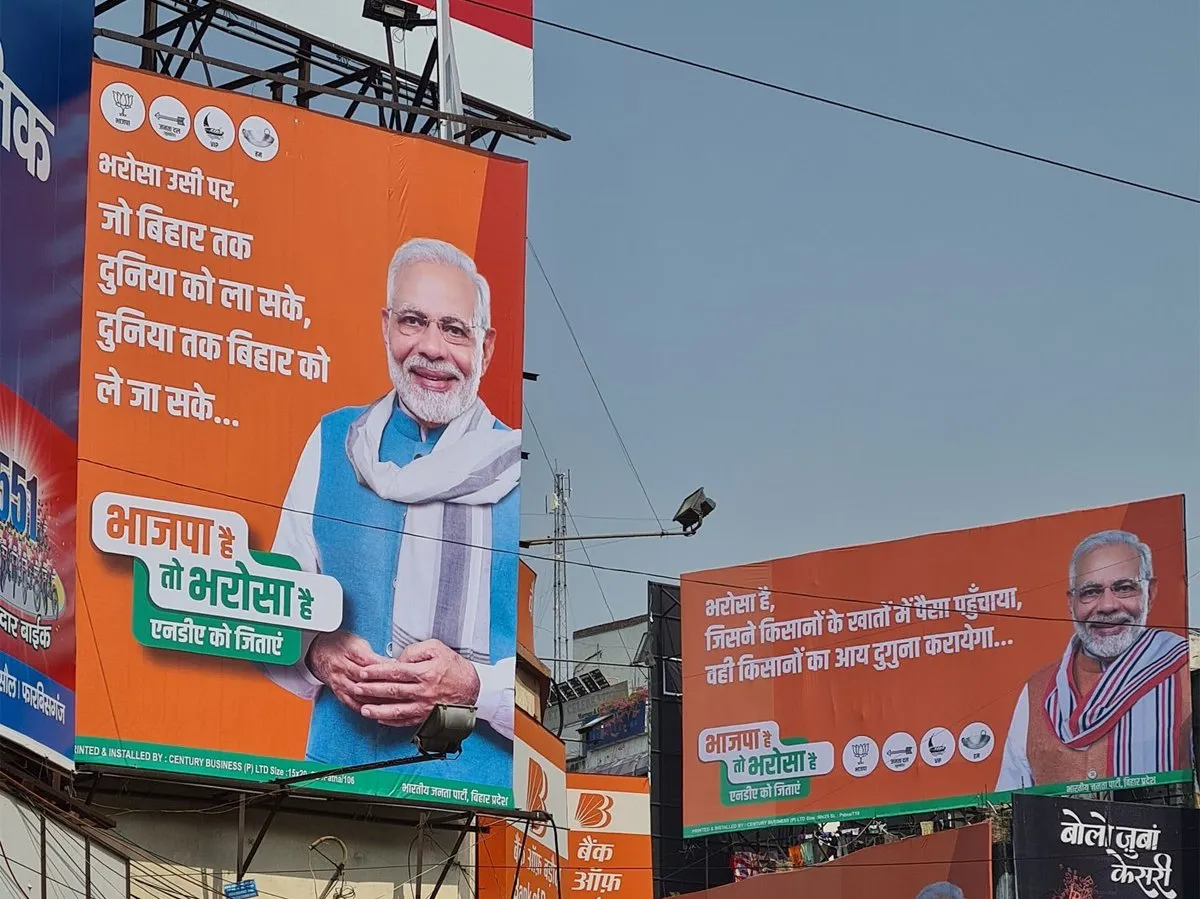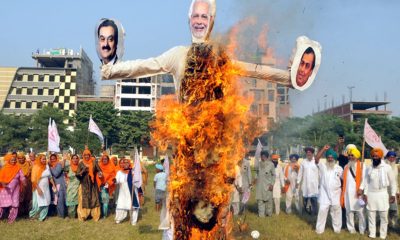News
India’s Top Corporations Funding Prime Minister Narendra Modi’s party

According to a Reuters analysis of public records, the headquarters of an electoral trust operated by just two individuals is located behind the doors of a small, unassuming office in the heart of New Delhi in India.
The Prudent Electoral Trust has raised $272 million since its inception in 2013, with around 75% of that going to Prime Minister Narendra Modi’s party. The trust’s donations to the BJP are ten times greater than the $20.6 million it gave to the opposition Congress party, according to the data.
The previous Congress-led administration established electoral trusts in 2013 to enable for tax-free contributions to political parties. It stated that the approach will increase transparency in campaign financing by lowering cash contributions, which are more difficult to trace.
However, other election experts argue that the trusts contribute to opacity surrounding political party finance in India, where this year’s general election, set to take place within weeks, is projected to put Modi to power for a rare third term, according to surveys.
While Prudent does not disclose how specific corporate donors’ gifts are divided, Reuters examined public documents from 2018 to 2023 to trace flows from some of India’s major corporations.
According to Reuters, eight of India’s largest business groups donated at least $50 million to the trust between 2019 and 2023, after which the foundation delivered cheques to the BJP.
Four businesses mentioned by Reuters in transactions – steel company ArcelorMittal Nippon Steel), telco Bharti Airtel, infrastructure developer GMR, and energy major Essar – have not provided money to the party directly and are not on its donor list.
In response to Reuters‘ inquiry, GMR and Bharti Airtel stated that Prudent selects how donations are disbursed.
Prudent makes decisions
Prudent makes decisions “as per their internal guidelines, which we are unaware of,” according to a GMR spokesman. He also stated that the corporation doesn’t “like to align with any political party.”
Bharti Airtel, which founded Prudent before handing over authority to independent auditors Mukul Goyal and Venkatachalam Ganesh in 2014, claimed it has “no influence on the decisions, directions, and mode of disbursal of funds.” The other groups’ spokespeople did not return phone calls, text messages, or emails.
Goyal and Ganesh did not react to inquiries received via email or post. When asked about how Prudent worked during a brief phone chat, Goyal responded, “That is something we do not discuss.”
Prudent, the largest of India’s 18 electoral trusts, is legally compelled to reveal how much it has collected from each contributor and how much it has given to each party.
However, it is the only one of India’s four main electoral trusts that accepts contributions from multiple corporate groups.
Trusts “provide one layer of separation between firms and parties,” said Milan Vaishnav, an expert on Indian campaign money at the Carnegie Endowment for International Peace, a think tank in Washington.
Political funding in India is typically seen as murky, with the majority of political donations remaining undeclared, Vaishnav stated.
Financial influence over India’s Congress
The BJP’s most recent public statement in March 2023 stated that their political war chest, which included financial reserves and assets, was worth 70.4 billion rupees ($850 million).
This provides it a massive financial advantage over Congress, which has 7.75 billion rupees in funds. BJP spokespersons did not reply to many requests for comment on this story.
According to the documents, Prudent was also the highest known donor to the Congress party in the decade leading up to March 2023.
In a February campaign finance verdict, India’s Supreme Court stated that corporate contributions are “purely business transactions with the intent of securing benefits in return.”
Reuters was unable to determine whether political parties know the identities of contributors who give through trusts that accept contributions from multiple groups.
MV Congress’s head of research, Rajeev Gowda, told Reuters that electoral trusts are a “semi-fig-leaf” and that he believes parties know the donors’ identities. Gowda, who does not oversee the party’s finances, did not give evidence.
Companies affiliated with billionaires
The Tata Group’s Progressive Electoral Trust is the BJP’s next greatest known donor, having donated the party 3.6 billion rupees collected from the conglomerate’s firms. Progressive is also Congress’ second-largest donor, having contributed 655 million rupees.
Progressive’s bylaws require it to distribute funds in accordance to the number of seats held by each party in parliament. Prudent has no equivalent limits, and a Reuters review of its donations revealed no such pattern.
Trusts may retain up to 300,000 rupees for annual operational expenses. Remaining funds must be disbursed during the fiscal year in which they were received.
In its study of Prudent’s contribution reports filed with electoral officials, Reuters discovered 18 transactions between 2019 and 2022 in which the eight corporate entities made big gifts to the trust. Prudent promptly issued cheques to the BJP for the same sums.
Prior to the 18 contributions, which do not include all of the groups’ gifts to Prudent, the trust lacked sufficient funds to make payments to the BJP. Companies affiliated with billionaire L.N. Mittal’s ArcelorMittal group were among Prudent’s most generous donors.
On July 12, 2021, for example, ArcelorMittal Design and Engineering Centre Private Limited handed Prudent a cheque for 500 million rupees ($6.03 million). Prudent issued a check to the BJP for the same amount the following day.
ArcelorMittal Nippon Steel India also granted Prudent 200 million rupees on November 1, 2021, and 500 million rupees on November 16, 2022. The corresponding sums were sent to the BJP on November 5, 2021, and November 17, 2022. A spokesperson for ArcelorMittal did not reply to calls for comment.
Massive Corporate Funding
Meanwhile, Bharti Airtel released 250 million rupees to Prudent on January 13, 2022, and 150 million rupees on March 25, 2021. On January 14, 2023 and March 25, 2021, the trust issued cheques to the BJP in the amounts specified.
Three firms in the RP-Sanjiv Goenka group – Haldia Energy India, Phillips Carbon Black, and Crescent Power – issued cheques for 250 million rupees, 200 million rupees, and 50 million rupees on March 15, March 16, and March 19, 2021.
Prudent gave the BJP a 450-million-rupee cheque on March 17, and another 50-million-rupee payment on March 20.
Reuters was unable to find a similar pattern of monies being deposited to the trust and then quickly transferred to Congress.
However, Reuters discovered a similar pattern involving two regional parties. Megha Engineering and Infrastructure transferred 750 million rupees to Prudent in three separate transactions between July 5 and July 6, 2022.
On July 7, the trust gave a cheque for 750 million rupees to Bharat Rashtra Samithi, a centrist party in Telangana state, where the Megha group is based.
On November 27, 2020, Avinash Bhosale Group, a property developer situated in the western Maharashtra state, paid Prudent 50 million rupees.
On November 30, the trust sent a cheque for that amount to the Maharashtra Pradesh Nationalist Congress Party, which is independent of the national Congress party.
The corporate groupings did not immediately respond to calls for comment. The BRS’s general secretary stated he was “not aware” of the specifics of the donations, while a senior NCP official noted the party had recently split and “every record will not be available with us.”
According to public records and party reports, the BJP’s war chest has increased from 7.8 billion rupees ($94.09 million) in March 2014 to 70.4 billion rupees in March 2023. Congress’s funds climbed from 5.38 billion rupees to 7.75 billion rupees during the same time frame.
BJP and Congress a concern
The fundraising difference between the BJP and the Congress is cause for concern, according to Jagdeep Chhokar of the Association of Democratic Reforms, a Delhi-based civil society organization that was the primary petitioner in the Supreme Court’s electoral bonds case.
“Level playing field is an essential part of democracy,” he went on to say.
Some BJP officials have previously claimed that the vast money raised on its books demonstrate the party’s transparency.
Electoral bonds, a structure that permitted contributors to provide limitless amounts to parties without public disclosure, have benefited the BJP the most.
It received 65.66 billion rupees out of the 120.1 billion rupees in such bonds sold during their inception in January 2018 and March 2023. In all but one fiscal year since their introduction, such bonds accounted for more than half of the BJP’s total contributions.
In February, the Supreme Court declared the method “unconstitutional” and ordered the government-owned State Bank of India, which issued the bonds, to disclose buyer information. Specifics will be available by March 15.
Source: Reuters




































